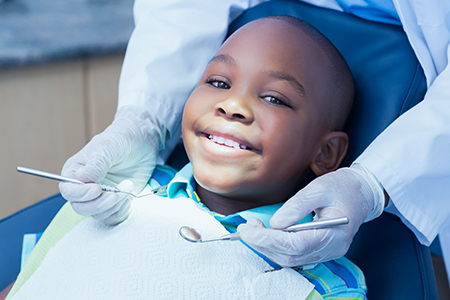

At the office of Silk Dental Delray Beach (formerly Marc Bilodeau DMD), the health and growth of your child's smile guide every decision we make. Our focus is to help young patients build strong habits, avoid preventable problems, and feel confident in the dental chair. We combine gentle care with clear explanations so families leave each visit with practical steps they can use at home to protect developing teeth and gums.

Healthy adult teeth begin with healthy primary teeth. Early dental visits allow us to evaluate development, identify risk factors and teach parents and children effective oral care routines. We emphasize prevention: establishing brushing and flossing habits, identifying problematic feeding practices, and recommending age-appropriate protective measures like topical fluoride and sealants when indicated.
Our team creates a welcoming atmosphere so first appointments are positive and educational rather than frightening. We use child-friendly language and demonstrate tools and techniques so kids understand what to expect. Calm, predictable visits build trust and make it easier for children to accept routine care over time.
Working closely with parents, we set realistic goals appropriate to each child’s age and temperament. Whether it’s coaching a toddler through brushing or preparing a teen for orthodontic treatment, our approach blends clinical expertise with supportive guidance so families feel informed and empowered.

Successful pediatric care depends on teamwork between the practice and caregivers. We listen to parents’ concerns, review medical history and daily routines, and then tailor advice that fits each family's lifestyle. Our goal is to make oral health guidance practical — small changes at home often produce the biggest long-term gains.
Education is central to our approach. During appointments we demonstrate techniques for effective brushing and flossing, review nutritional choices that support dental development, and discuss strategies to reduce habits that may harm tooth alignment. We also help families anticipate developmental milestones so they know what to watch for as their child grows.
We respect parental preferences and collaborate on treatment planning. When a procedure is recommended, we explain why it’s needed, describe what will happen, and outline any follow-up care. This transparent communication keeps families comfortable and confident in the care their child receives.
Routine exams let us identify concerns early — when treatment can be simpler and more conservative. We typically recommend periodic visits so we can track tooth eruption, evaluate bite development, and screen for cavities or gum problems. Regular cleanings remove plaque buildup and allow us to coach proper home care.
As part of a comprehensive exam we review growth patterns, check oral tissues for signs of disease, and take digital radiographs only when necessary to see beneath the surface. These images help detect decay that isn’t visible in a clinical exam and allow us to monitor developing permanent teeth with precision.
Preventive services such as topical fluoride and dental sealants are offered when appropriate to add layers of protection against decay. Our focus is always on minimally invasive interventions that preserve natural tooth structure and promote long-term oral health.
Tooth decay remains one of the most common childhood conditions, but it is largely preventable. We work with families to reduce decay risk by addressing dietary contributors like frequent sugary snacks and nighttime bottles, reinforcing effective brushing with fluoride toothpaste, and scheduling timely professional care.
When decay is identified, modern pediatric dentistry offers conservative options to restore teeth and prevent the problem from progressing. Prompt treatment relieves pain, protects developing permanent teeth, and helps avoid more invasive procedures later on.
Start preventive dental care early and bring children to the dentist for routine partnership and monitoring.
Clean baby and toddler teeth regularly and introduce an age‑appropriate toothbrush and pea‑sized fluoride toothpaste as recommended.
Avoid allowing infants to fall asleep with bottles filled with milk or juice to reduce decay risk.
Keep scheduled checkups so problems can be caught and managed early.
Lead by example: demonstrate consistent brushing and flossing to encourage lifelong habits.
Choose balanced snacks and water over sugary drinks to support healthy teeth and overall development.
Help your child transition away from pacifiers and thumb‑sucking at the appropriate age to protect alignment.
Ensure your child wears a properly fitted mouthguard for contact sports and activities with a risk of dental injury.

Tooth development begins long before a child’s first birthday, and many infants begin to show front teeth between six and twelve months. Early dental visits — often around the first birthday — give parents guidance on teething comfort measures, proper cleaning techniques for emerging teeth, and how to reduce decay risks during feeding.
We explain safe and soothing approaches to teething, such as chilled teething rings or a cool cloth, and provide clear instructions on how to clean delicate new teeth and gums. As more teeth come in, we recommend supervised brushing and introduce fluoride toothpaste at the appropriate age.
Primary (baby) teeth play essential roles in chewing, speech development, and holding space for permanent teeth. Protecting them through prevention and early care helps avoid complications that can affect a child’s oral development later on.
Children’s dental needs change rapidly as they transition from primary to permanent dentition. Through adolescence they may need guidance on orthodontic timing, treatment for sports injuries, or restorative care for decayed or injured teeth. Our team monitors these changes and recommends interventions when they will be most effective.
We also focus on teaching older children and teens the self-care skills they need for independence: proper brushing and flossing technique, the importance of regular dental visits, and strategies to protect enamel from acidic or sugary diets. These conversations are tailored to be age-appropriate and respectful of a young person’s growing autonomy.
When orthodontic concerns arise, we discuss the reasons to refer for evaluation and what to expect from interceptive or comprehensive orthodontic care. Early recognition of bite or jaw issues allows families to make informed decisions about the timing and type of treatment.
We assess jaw development and tooth alignment as part of routine exams, watching for patterns that suggest future orthodontic needs. Early identification does not always mean immediate treatment, but it does allow for proactive planning and, when appropriate, timely referrals to specialists to guide facial growth in a favorable direction.
A well‑balanced diet supports strong teeth and healthy gums. We counsel families on limiting frequent exposure to sugars and acidic beverages, choosing tooth‑friendly snacks, and emphasizing hydration with water. These practical dietary strategies, combined with consistent oral hygiene, create an environment where teeth stand the best chance of staying healthy.
Summary: Pediatric dentistry is about prevention, education, and thoughtful intervention at every stage of childhood. From the first tooth to the final molars, our team provides age-appropriate care in a compassionate setting and partners with families to build lifelong habits. For more information about pediatric services or to discuss your child’s needs, please contact us.
A pedodontist is a dentist who has received advanced specialty training in meeting the dental needs of children from infancy to adolescence. Pedodontists, also referred to as "pediatric dentists," study child psychology, behavior management, caring for children with special needs, methods of handling oral/facial trauma, and various techniques for providing anesthesia and sedation. Pedodontists also understand the complexities of facial growth and development and have the clinical skills required to meet the dental needs of all children at every stage of development. Most of all, pedodontists are passionate about what they do and enjoy working with children. They strive to make every dental experience a positive one as they help children establish a strong foundation for good oral health.
Even before your child is born, their first set of teeth is already forming. In fact, by one year of age, some of your baby's front teeth will have already come into place. While the arrival of your baby's first teeth is only one of many developmental milestones, it represents an excellent time to begin a program of oral care. According to recommendations from the American Dental Association, babies should see the dentist around the time of their first birthdays.
Your baby's first teeth typically begin to appear in the 6 to 12-month range. While this is an extraordinary milestone, you need to be aware that your baby may find the experience a little bit uncomfortable. Teething can make babies feel irritable. They may be fussy, have trouble sleeping, not want to eat, and drool quite a bit.
Although you are powerless to speed up the process of teething, there are a few things that you can do to soothe your baby as the new teeth are erupting into place. Common approaches to helping your baby feel more comfortable while getting new teeth, include teething rings or a cold spoon or moist gauze rubbed over their gums.
Even for these few new teeth, it's absolutely essential to establish an effective regimen of oral care. For information on when your baby's first set of teeth will erupt into place, consult this timeline from the American Dental Association: Eruption Charts
Some children persist in sucking their thumbs or fingers beyond their preschool years. For these children, the activity continues to be a source of comfort, relaxation, and security. It may even help them fall asleep at night. However, it's essential to be aware that in the long-term, a finger sucking habit is not healthy.
If your child's thumb or finger sucking habit is still present when the permanent teeth begin to come in, your child is at a higher risk of developing a bad bite. By the age of five or six years, you need to constructively and gently help your child stop the habit.
It's also a good idea to have a comprehensive evaluation at this time. Your pedodontist can assess if there are any habit related alterations to the alignment of your child's teeth or jaws, or if it is affecting their speech or swallowing patterns. They can also discuss habit control strategies with you, as well as follow your child's bite and facial development as they grow. If interceptive appliances or corrective orthodontic care are recommended, the timetable and best options in care will be explained in complete detail.
Quick Links